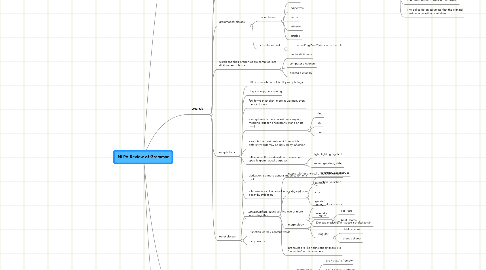
1. sentences
1.1. general properties
1.1.1. composed of phrases
1.1.2. goverend by grammar
1.1.3. word order and morphology determined by syntax
1.1.4. usually contain a verb (in some languages, implied)
1.1.5. represent: statements, questions, commands
1.1.6. a grammatical unit
1.2. components
1.2.1. phrases
1.2.1.1. groups of words that function as a single unit in the structure of a sentence
1.2.2. clauses
1.3. phrase structure
1.3.1. phrase structure
1.3.2. common english phrase structure
1.3.2.1. noun phrase
1.3.2.2. verb phrase
1.3.2.3. prepositional phrase
2. grammatical categories
2.1. nouns and pronouns
2.1.1. nouns refer to physical or abstract objects
2.1.2. properties
2.1.2.1. number
2.1.2.2. case
2.1.2.3. gender
2.1.3. morphology
2.1.3.1. regular
2.1.3.1.1. cat : cats
2.1.3.1.2. boat : boats
2.1.3.2. irregular
2.1.3.2.1. child : children
2.1.3.2.2. sheep : sheep
2.1.4. pronouns are like nouns but act more like "variables" or placeholders
2.2. determiners and adjectives
2.2.1. determiners
2.2.1.1. the / that / a / empty
2.2.1.2. new / previous referent
2.2.1.3. unique or generic
2.2.1.3.1. the car / a car / cars
2.2.2. adjectives
2.2.2.1. properties or attributes of nouns
2.2.2.2. positive, comparative, superlative
2.2.2.2.1. good / better / best
2.2.2.3. quantifiers
2.2.2.3.1. some, all, any, many, ...
2.3. verbs
2.3.1. represent action, change, or state
2.3.2. properties
2.3.2.1. tense
2.3.2.2. agreement
2.3.2.3. auxiliary
2.3.3. sometimes collapsed with adjectives
2.3.3.1. "red" = "is red"
2.3.3.2. "red car" = "car which is red"
2.4. adverbs
2.4.1. modify verbs
2.4.2. analogous to adjectives, but for verbs
2.5. prepositions
2.5.1. grammatical functions
2.5.2. in, on, at, ...
2.6. conjunctions
2.6.1. words that connect phrases or sentences
2.6.1.1. me and you
2.6.1.2. You get a good grade if you answer the questions well.
3. words
3.1. smallest element of natural language that carries a meaning when uttered in isolation
3.2. "minimal free form" (Bloomfield)
3.3. grammatical classes
3.3.1. main classes
3.3.1.1. nouns
3.3.1.2. adjectives
3.3.1.3. verbs
3.3.1.4. adverbs
3.3.1.5. articles
3.3.2. substitution test
3.3.2.1. The (red/big/*on/*is) car is on the lot.
3.4. words and their properties are compiled into dictionaries or lexica
3.4.1. mental dictionary
3.4.2. computer dictionary
3.4.3. printed dictionary
3.5. morphology
3.5.1. different words are related by morphology
3.5.2. dog -> dogs, go -> going
3.5.3. few forms in English, more in German, even more in Finnish
3.5.4. a morpheme is the smallest unit carrying meaning (but can't necessarily stand on its own)
3.5.4.1. -ing
3.5.4.2. un-
3.5.4.3. pre-
3.5.5. a root is the most basic unit from which different words may be derived by inflection
3.5.6. inflection is the modification of a root for specific grammatical purposes
3.5.6.1. light, lighting, lighted
3.5.6.2. sehen, gesehen, sieht
3.5.7. derivation is a more general modification of a root
3.5.7.1. construct, deconstruct
3.5.7.2. sehen, versehen
3.5.8. a lexeme is a collection of words derived from a root by inflection
3.5.9. compounding means sticking two or more words together
3.5.9.1. garage door opener
3.5.9.2. overtake
3.5.9.3. Donaudampfschiffahrtsgesellschaftskapitän
3.6. other classes
3.6.1. function words / content words
3.6.2. stop words
4. linguistics
4.1. Classical question: Is a sentence grammatical?
4.2. "Rationalist" vs "empiricist" approaches
4.3. Capability vs performance distinction
4.4. some enormously complex theories and lots of religion
4.5. in practice, the empiricist approach is the one primarily used
4.5.1. large corpora
4.5.2. statistics
4.5.3. machine learning
4.6. nevertheless, much of the terminology of classical linguistics is still used in empiricist language processing
4.7. linguistics deals with language at several levels
4.7.1. phonology / orthography
4.7.1.1. rules for the composition of words out of phonemes and syllables
4.7.1.2. possible: "ka" impossible: "ksa" (Japanese)
4.7.1.3. possible: "crag" impossible: "crngrorng" (English)
4.7.2. morphology
4.7.2.1. rules for the composition of words out of morphemes
4.7.2.2. go : went / go : *goed
4.7.2.3. gehe / ging : gehe : *gangte
4.7.3. grammar / syntax
4.7.3.1. rules for the composition of sentences out of words
4.7.3.2. The cat sees the dog. / *The cat dog the sees.
4.7.3.3. Gestern sah ich Peter. / *Gestern ich sah Peter.
4.7.4. discourse
4.7.4.1. rules for how sentences relate to each other
4.7.4.2. can be quite complex
4.7.4.2.1. Example
4.7.4.2.2. Implies
4.7.4.3. you can lie at the discourse level
4.7.4.3.1. Example
